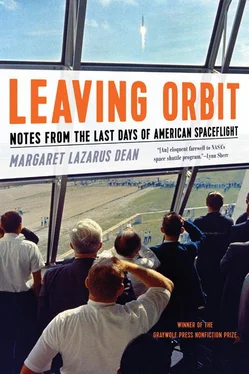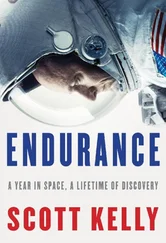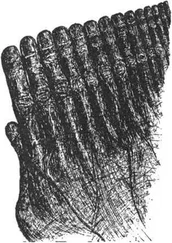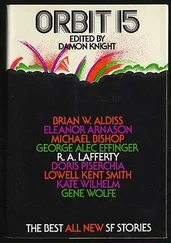The SpaceX press conference is pretty much what you would expect—a lot of reminders that this is a new rocket, that spaceflight is an untested business, a lot of cautious optimism for the next attempt, which won’t be for a few days because of a scheduled Soyuz docking that takes precedence. I get my first good look at Gwynne Shotwell, the president of SpaceX. She is whip smart in that put-together way you would expect in the president of an experimental tech company. But she is also intense and sincere and kind of adorable. She smiles a lot, her eyes twinkle. Her answers to questions are thoroughly well considered—her pauses between thoughts remind me of the pauses politicians leave themselves to scan what they are about to say for possible controversy—but a real love for what she does shines through. I came here planning to dislike SpaceX, and while Gwynne Shotwell doesn’t exactly defy my every expectation, I still find myself liking her in spite of myself. In part, I know that I am a sucker for women involved in spaceflight, for women in jobs traditionally closed to them, and I can’t help but suspect that Elon Musk, SpaceX’s founder, had this appeal in mind when he chose her to run his space company.
* * *
I’m at a postlaunch party, my second official EndlessBBQ (“It really is endless,” I joke on Twitter, before noticing how many other people have made the same joke), standing on the deck behind the Cocoa Beach Brewing Company with a few dozen space people. The sun is setting as I drink one of the microbrews made here and talk with Omar and some of the people I’ve met at launches and on Twitter. A lot of them are here with the NASASocial. It’s a beautiful evening, not too humid for once.
I wind up in a long conversation with Jen Scheer, a woman I met at the party after Atlantis but never really talked to. I know her well from Twitter because she tweets avidly about space and is the founder and organizer of the Space Tweep Society, which makes her a celebrity of the online space community. Jen worked maintaining the hypergolic systems in the orbital maneuvering system pods and was one of the few female techs to work at the space center. Tonight, while we drink beer, I’m quizzing her about safety procedures—I’ve been trying to get a handle on whether NASA became overly safety conscious after Columbia , as some insiders have told me, or not safety conscious enough—when Omar drifts over. Jen asks about how work has been, and he tells her how unnerving it’s been that visitors are now allowed to touch the orbiters.
“Hey, Omar,” Jen starts with a big smile, “do you know what we used to call the tiles?”
“What?” Omar asks warily.
“Wrench cushions.” Jen waits, open mouthed, for his reaction. Omar flinches.
“Aaagh,” he moans quietly. “Don’t put your wrenches on my tiles.”
Jen laughs. “Of course if any tiles got damaged the tile techs would replace them,” she assures me.
“I’m going to get another beer,” Omar says, “and when I come back we’ll be talking about something else.”
Omar has told me how upsetting it’s been seeing procedures change after the last landings, watching equipment that had been maintained with exquisite care now torn apart for scrap. Seeing visitors invited to touch things he spent years of his life making sure never got touched seems to elicit something like primal panic in Omar, and if he were less good-hearted that panic might metastasize into rage and resentment. Instead, he seems a little fuzzy these days, a little confused. When he comes back from the bar, we do talk about something else. Jen has been out of the space center workforce for a while now, so she has had time to get used to the changes. Omar still goes in every day, still walks through the same motions, but with no real purpose.
Later I strike up a conversation with Andy Scheer, Jen’s husband, also a spaceworker. Andy tells me he is a pad rat, which means that rather than working with a specific orbiter, he works on a specific launchpad.
“Was there a rivalry,” I ask him, “between people who worked at one pad or the other?”
“Oh yeah,” he says. “Just like anyplace. Pad A people made fun of Pad B people, Pad B people made fun of Pad A people. Then it came down to one pad, and the people who were left had to work together.”
I’ve heard a rumor that Andy was at work the day James Vanover, the engineer who had tried to rescind his early retirement and was told he could not, committed suicide by jumping off the launch tower, back in March 2011. When it had first happened, I’d thought I should ask Omar about the meaning of Vanover’s gesture, but when I saw Omar next, the morning of the launch of Endeavour , it didn’t seem right to bring it up. But now I decide to ask Andy.
“Yeah, I was there,” Andy tells me. He’s quiet for a minute.
“We’d walk around the pad first thing when we started a shift, looking for loose debris or anything out of place, and out of the corner of my eye I thought I saw something fall. I was the closest to him when he hit. I knew right away what had happened.”
“That’s awful,” I say. I don’t know what else to add.
“Yeah. Paramedics came pretty quickly. But until they arrived, there was nothing I could do except to sit with him.”
We both look down into our beers.
“I know he cared about what he did,” Andy adds. “I know he loved what he did and loved that place. His whole life was out there and that was coming to an end.”
Put this way, it’s remarkable that there haven’t been more suicides, more violence, more family tragedies. Vanover’s whole life was out there, and that was coming to an end, and the same is true for tens of thousands of people.
“So what’s your book about?” Andy asks. “Omar said you’re writing a book.”
“Oh, it’s about the end of shuttle,” I answer. “I’m asking what it means that we went to space for fifty years and have decided not to go anymore.”
“Good question,” Andy says. I used to feel silly repeating this question, but I’ve come to realize that no one feels confident about having a good answer to it. Everyone says it’s a good question. “What do you think is the answer?”
“I don’t entirely know yet,” I tell him. “But I think it has to do with the beginning, with how it started. The start was an accident. Without Sputnik, and a new president, and the Cold War, and then that president getting assassinated—without the German rocket designers who fled to the United States instead of the Soviet Union—it never would have happened at all.”
Andy is quiet for a long moment. I’m afraid I’ve offended him by calling his life’s work an accident.
Omar waves us over—he wants to show us something on his phone.
“Check this out,” Omar says. He’s found a video on NASA TV documenting the Discovery Day event we were at together. Exciting electronic music plays over a montage of Discovery arriving at Dulles and Enterprise being wheeled out of the museum.
“Look, right here!” It’s a swooping crane shot of Discovery moving toward the building—I remember seeing the crane with the movie camera on it when we were out there—but then suddenly, in the bottom of the frame, I see Omar and myself, the backs of our heads, standing shoulder to shoulder watching Discovery roll by. We are unmistakable, Omar in his white ball cap, me with my blond ponytail, trying to take a picture of Discovery with my phone.
Omar seems pleased to find himself in the video commemorating the celebration of his bird, and he should—it’s a document he can show his grandchildren. I was there. The video already has more than thirty thousand hits. But I find it disconcerting. I’m trying to write about these things that I’ve experienced, and in trying to write about them I often consult pictures and video I find online to help me understand where everything was, to reconstruct what things looked like. It’s an unsettlingly postmodern experience to find myself in one of these documents, like looking up a word in the dictionary and finding my own name.
Читать дальше









